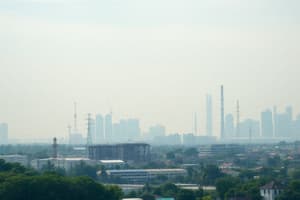Podcast
Questions and Answers
Apa yang dimaksud dengan polusi udara dan apa dampaknya terhadap kesehatan manusia?
Apa yang dimaksud dengan polusi udara dan apa dampaknya terhadap kesehatan manusia?
Polusi udara adalah kontaminasi atmosfer oleh zat-zat berbahaya yang membuatnya tidak sehat untuk manusia, hewan, dan tumbuhan. Dampaknya terhadap kesehatan manusia antara lain masalah pernapasan, penyakit kardiovaskuler, masalah neurologis, dan kanker.
Apa saja sumber polusi udara?
Apa saja sumber polusi udara?
Sumber polusi udara dapat berasal dari sumber alami seperti letusan gunung berapi, kebakaran hutan, dan proses biologis. Sumber lainnya berasal dari aktivitas manusia seperti pembakaran bahan bakar fosil, proses industri, kegiatan pertanian, dan pembuangan sampah.
Apa saja jenis polutan udara?
Apa saja jenis polutan udara?
Jenis polutan udara antara lain partikulat, nitrogen oksida, sulfur dioksida, senyawa organik volatile, karbon monoksida, dan ozon.
Bagaimana polusi udara dapat mempengaruhi kesehatan manusia?
Bagaimana polusi udara dapat mempengaruhi kesehatan manusia?
Apa saja dampak lingkungan dari polusi udara?
Apa saja dampak lingkungan dari polusi udara?
Bagaimana cara mengurangi polusi udara?
Bagaimana cara mengurangi polusi udara?
Flashcards are hidden until you start studying
Study Notes
Air Pollution
Definition
- Air pollution: the contamination of the atmosphere by harmful substances, making it unhealthy for humans, animals, and plants.
Causes
- Natural sources: volcanic eruptions, wildfires, and biological processes
- Human activities:
- Burning fossil fuels (coal, oil, gas) for energy and transportation
- Industrial processes (e.g., smelting, refining)
- Agricultural activities (e.g., pesticide use, livestock farming)
- Waste disposal (e.g., landfills, incineration)
Types of Air Pollutants
- Particulate matter (PM): small particles (e.g., dust, soot, smoke) that can cause respiratory problems
- Gases:
- Nitrogen oxides (NOx): contribute to smog and acid rain
- Sulfur dioxide (SO2): causes acid rain and respiratory issues
- Volatile organic compounds (VOCs): react with other pollutants to form ground-level ozone
- Carbon monoxide (CO): toxic gas that can cause headaches and dizziness
- Ozone (O3): ground-level ozone can cause respiratory problems and irritate eyes, nose, and throat
Effects on Human Health
- Respiratory problems: asthma, chronic obstructive pulmonary disease (COPD), bronchitis
- Cardiovascular diseases: heart attacks, strokes, and other cardiac issues
- Neurological problems: headaches, dizziness, and cognitive impairment
- Cancer: long-term exposure to air pollutants can increase cancer risk
Environmental Impacts
- Ecosystem damage: air pollution can alter ecosystems, affecting plant and animal life
- Climate change: certain air pollutants contribute to global warming and climate change
- Acid rain: sulfuric and nitric acid in the atmosphere can acidify lakes, rivers, and soil
Solutions
- Reduce energy consumption: increase energy efficiency and use renewable energy sources
- Improve fuel efficiency: use cleaner fuels and more efficient vehicles
- Implement emission controls: regulate industrial emissions and enforce pollution standards
- Promote sustainable land use: reduce deforestation, preserve natural habitats, and adopt sustainable agriculture practices
Studying That Suits You
Use AI to generate personalized quizzes and flashcards to suit your learning preferences.




